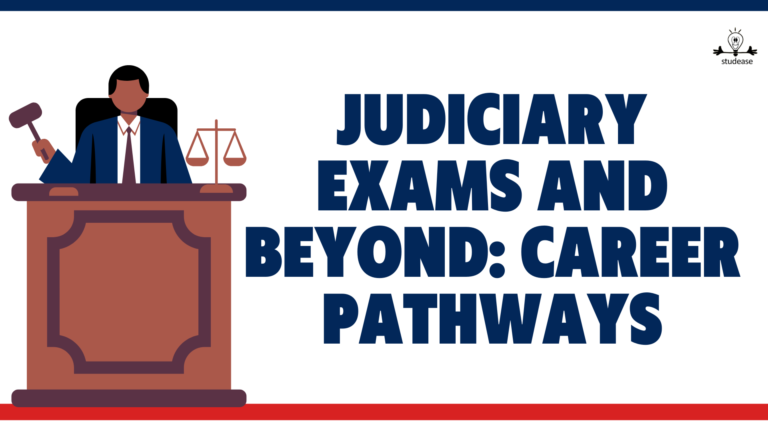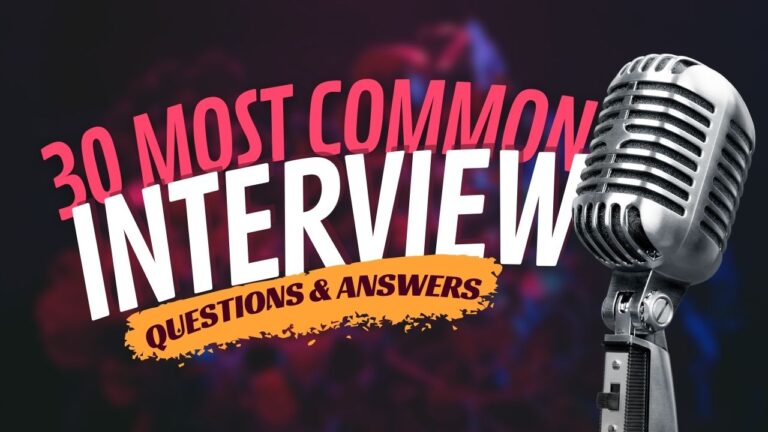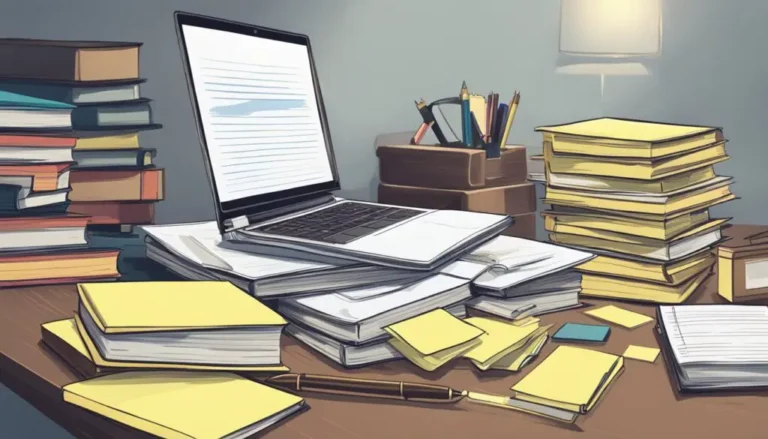110 Interview Questions for Barclays: A Comprehensive Guide for Job Seekers
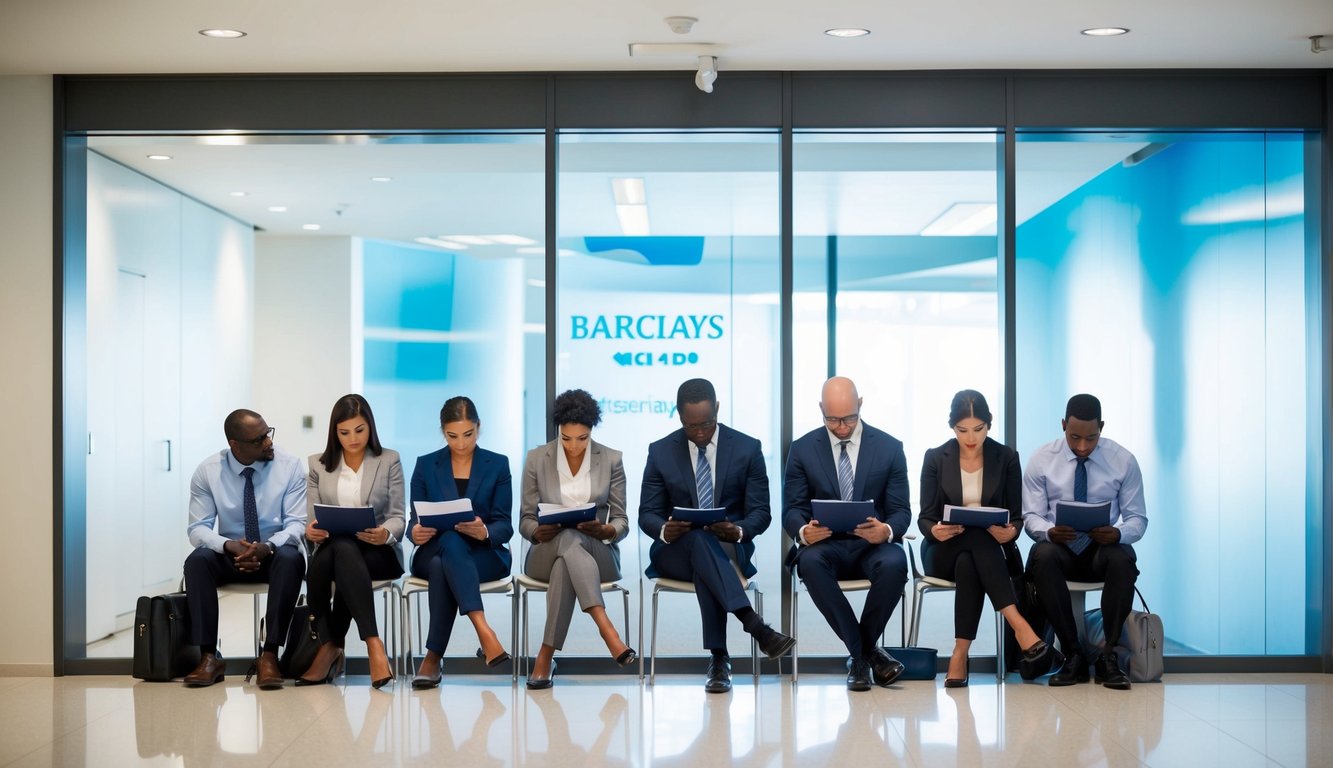
Preparing for an interview at Barclays, it’s a great opportunity to showcase your skills and knowledge. This guide of 110 interview questions for Barclays helps you focus on what matters during the interview process. It covers everything from technical skills to personal achievements and how to align your experiences with the values and needs of Barclays.
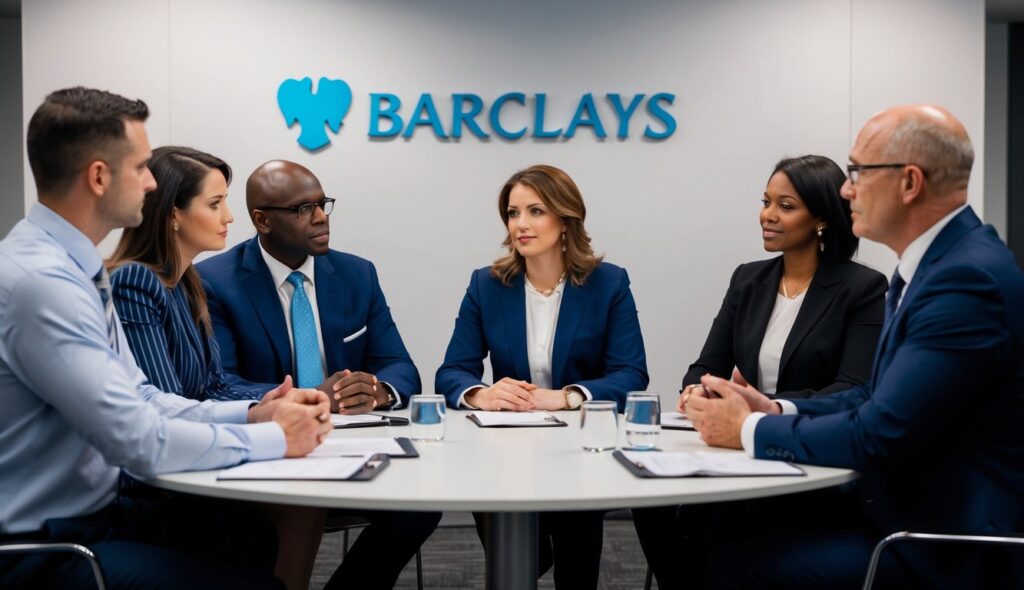
You might face questions about your past work experience, your ability to handle challenges, and how you plan to contribute to the team. Understanding the kinds of questions you might be asked and thinking through your answers helps build your confidence.
With these questions, you’re equipped to respond thoughtfully and clearly. This helps you stand out among other candidates and makes a strong impression on your interviewers.
Understanding the Barclays Interview Process

When preparing for a Barclays interview, it’s important to know what types of interviews you might face and what each entails. This knowledge can help you approach each stage with confidence and clear expectations.
Types of Interviews at Barclays
Barclays often uses several interview types to assess candidates. Phone interviews are common as a first step. This interview usually focuses on your background and interest in the company. It’s brief, often lasting few minutes.
Video interviews can be part of the process too.
In-person interviews are more detailed. They assess your technical skills, problem-solving ability, and cultural fit. Meeting with different team members is common, which helps the company get a full picture of your strengths and weaknesses.
Preparation Strategies for Barclays Interview
Getting ready for your interview at Barclays involves focusing on two main areas: understanding the company’s values and culture, and having a clear grasp of the job description. This helps you align your responses with what Barclays is looking for during the interview.
Researching Barclays Values and Culture
Learning about Barclays’ values is crucial. They focus on Respect, Integrity, Service and Excellence. Understanding these values will help you tailor your answers to reflect what the company stands for.
Explore Barclays website, read their mission statement, and find related news articles. Check for employee reviews to gain insights into the work culture. This knowledge helps you show genuine interest and ensures your answers align with their expectations.
Doing this research also prepares you for questions about how you might fit into the company. You can share examples from past experiences that resonate with Barclays’ culture. Authenticity is key.
Reviewing the Job Description
Carefully examine the job description to understand the roles and responsibilities. Make a list of essential skills and experiences mentioned. This helps you highlight your strengths that match the job requirements.
Prepare specific examples of how you have successfully used these skills in previous jobs. Use bullet points to list achievements that relate closely to the role. This approach allows you to connect your experience with what Barclays seeks.
Think about potential questions related to the job duties. Practice answering by tying your skills back to the tasks you’ll be expected to perform. Tailoring your responses around this analysis will make a strong impression.
Common Interview Sections for Barclays

When interviewing at Barclays, expect a focus on personal background, behavior in past situations, and technical abilities. The questions are designed to understand how well you fit with the company culture and if your skills match the job requirements.
Personal Experience and Background
Interviewers often start with questions about your personal experience. They want to know who you are and what skills you bring.
- Tell us about yourself.
- What sparks your interest in banking?
- Why do you want to work at Barclays?
- Describe your strengths and weaknesses.
- Tell us about a challenge you faced at work and how you handled it.
- How do you handle stress?
- What are your career goals?
- Discuss a time when you had to learn a new skill quickly.
- How do you prioritize your tasks?
- Describe your work experience and what you learned from it.
These questions help the interviewer learn about your past roles, achievements, and how well you handle responsibilities.
Behavioral Questions
Behavioral questions focus on how you’ve acted in past situations. This gives insight into your problem-solving skills and adaptability.
- Describe a time when you worked under pressure.
- How do you deal with conflict in a team?
- Talk about a successful project and your role in it.
- Have you ever disagreed with a coworker? How did you resolve it?
- Share an example of setting a goal and achieving it.
- How do you keep motivated during difficult tasks?
- Tell us about a time you failed and what you learned.
- What is your approach to networking?
- How do you handle tight deadlines?
- Discuss a situation where your communication skills made a difference.
These questions reveal how you interact with others, cope with challenges, and drive successful outcomes.
Technical Skills and Knowledge
For technical roles, expect questions assessing your technical skills and concepts like Java and object-oriented programming.
- Explain the concepts of Encapsulation and Inheritance.
- How does Abstraction work in programming?
- Can you give an example of a project using Java?
- Describe the role of Java in finance.
- How do you approach debugging code?
- What tools do you use for version control?
- Explain a complex technical problem you solved.
- How do you stay updated with new technologies?
- Describe your experience with software development cycles.
These questions measure your technical expertise and ability to apply these skills in a work environment.
Role-Specific Questions
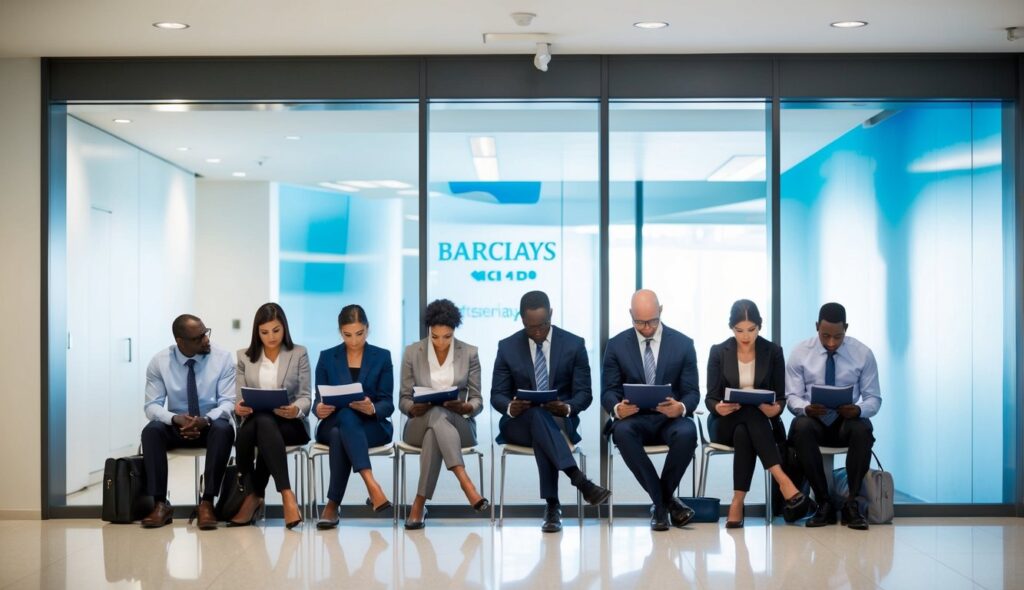
When interviewing for a position at Barclays, it is important to focus on questions tailored to the specific role. Whether you are applying for a position in finance or management, understanding key responsibilities and required skills will set you apart.
Finance and Banking Sector
In the finance sector, roles can be varied, including investment banking, retail banking, and corporate banking. Each requires a unique set of skills.
- How do you stay informed about the latest trends in financial services?
- Describe your experience with investment banking products.
- What is your approach to managing financial risk?
- Explain the difference between retail and corporate banking.
- How would you handle a complex financial analysis?
- Describe a successful investment strategy you have implemented.
- What financial software are you proficient in?
- Give an example of a time you improved a banking process.
- Describe your understanding of regulatory requirements in finance.
- How do you assess the financial health of a company?
Operations and Project Management
Roles in operations and project management include overseeing projects, managing teams, and applying methodologies. These positions are crucial for ensuring efficient operations.
- Give an example of a project you managed successfully.
- How do you prioritize tasks in a high-stakes environment?
- Explain your experience with project management tools.
- How do you ensure all project objectives are met?
- Describe how you use method overriding in project tasks.
- What is your approach to risk management in projects?
- How do you handle changes in project scope?
- Explain a situation where you improved operational efficiency.
- Describe your familiarity with using a route for data management.
- How do you address conflicts within your project team?
List of 110 Interview Questions for Barclays Bank Interview
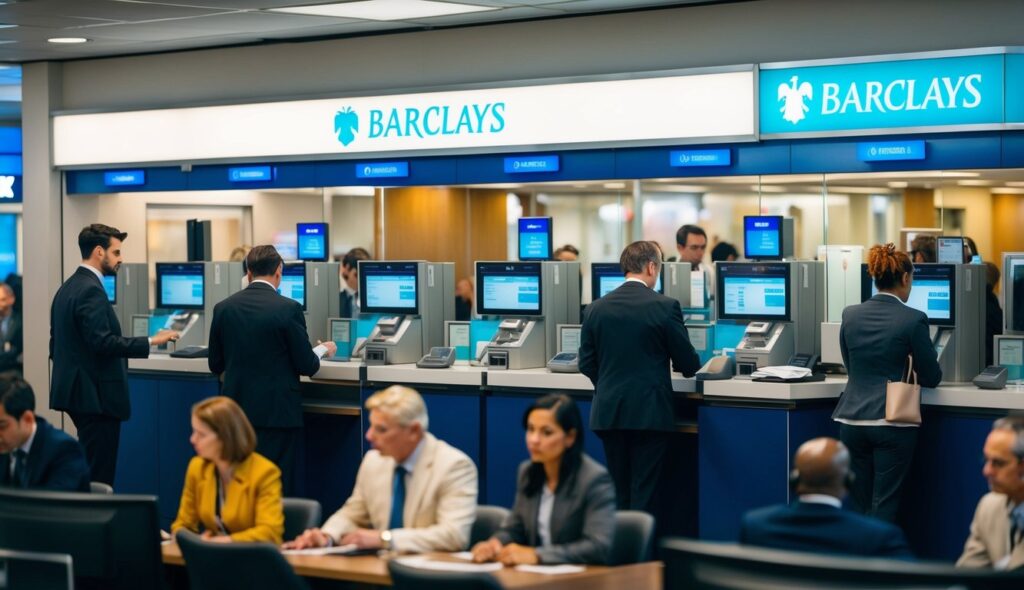
- Tell me about yourself.
- “I am a finance graduate with over three years of experience in the banking sector. I have worked in both customer service and financial analysis roles, where I developed strong analytical and communication skills. I am passionate about leveraging my expertise to help clients achieve their financial goals.”
- Why do you want to work at Barclays?
- “I admire Barclays’ commitment to innovation and customer service. I believe that my skills align well with the company’s mission, and I am excited about the opportunity to contribute to a leading global bank that values integrity and excellence.”
- What do you know about Barclays?
- “Barclays is a multinational bank, known for its diversified financial services, including retail banking, investment banking, and wealth management. The bank has a strong focus on sustainability and community engagement.”
- Describe your understanding of the role you are applying for.
- “I understand that this role involves managing client relationships, providing financial advice, and ensuring compliance with regulations. It requires strong analytical skills, attention to detail, and the ability to work collaboratively with a team.”
- What are your strengths and weaknesses?
- “One of my strengths is my ability to analyze complex financial data and present it in an understandable way. A weakness I am working on is my tendency to take on too much responsibility in team projects; I am learning to delegate more effectively.”
- How do you handle stress and pressure?
- “I handle stress by staying organized and prioritizing my tasks. I also find that taking short breaks helps me maintain focus and manage my energy levels during busy periods.”
- Give an example of a time you worked in a team.
- “In my previous job, I was part of a team tasked with launching a new financial product. We collaborated closely, sharing ideas and feedback, which ultimately led to a successful launch that exceeded our sales targets.”
- Describe a challenge you faced and how you overcame it.
- “I once faced a situation where a client was unhappy with our service. I took the initiative to meet with them, listen to their concerns, and provide a solution that addressed their issues. This not only resolved the situation but also strengthened our relationship.”
- Where do you see yourself in five years?
- “In five years, I see myself in a leadership position within Barclays, contributing to strategic initiatives and mentoring junior team members. I hope to grow my expertise in financial services and make a positive impact on the organization.”
- How do you prioritize your work?
- “I prioritize my work by assessing deadlines and the impact of each task. I use tools like to-do lists and project management software to keep track of my responsibilities and ensure I focus on high-priority items first.”
- What motivates you to perform well?
- “I am motivated by challenges and the opportunity to make a meaningful impact. I find satisfaction in achieving goals, both individually and as part of a team, and I thrive in environments that encourage growth and development.”
- How do you stay organized?
- “I use a combination of digital tools and traditional methods to stay organized. I keep a calendar for deadlines and meetings, and I maintain a task list that I update regularly to ensure I stay on top of my responsibilities.”
- Describe a time when you had to meet a tight deadline.
- “During a busy quarter, I was assigned a project with a very tight deadline. I created a detailed plan, broke the project into manageable tasks, and communicated regularly with my team to ensure we stayed on track. We completed the project on time and received positive feedback from management.”
- What is your experience with customer service?
- “I have over X years of experience in customer service roles, where I developed strong communication and problem-solving skills. I enjoy helping clients and ensuring they have a positive experience with our services.”
- How do you handle difficult customers?
- “I approach difficult customers with empathy and patience. I listen to their concerns, acknowledge their feelings, and work towards finding a solution that meets their needs while adhering to company policies.”
- What do you know about risk management?
- “Risk management involves identifying, assessing, and mitigating risks that could impact an organization. It is crucial in banking to protect the institution’s assets and ensure compliance with regulations.”
- How do you ensure compliance with regulations?
- “I stay informed about relevant regulations through continuous learning and training. I also ensure that I follow established procedures and guidelines in my work to maintain compliance.”
- Describe your experience with financial analysis.
- “In my previous role, I conducted financial analyses to assess the performance of various products. I used data analysis tools to generate reports that informed decision-making and strategy development.”
- What tools or software are you familiar with?
- “I am proficient in Microsoft Excel for data analysis, as well as financial software like SAP and X. I also have experience with CRM systems for managing client relationships.”
- How do you approach problem-solving?
- “I approach problem-solving by first identifying the root cause of the issue. I gather relevant information, brainstorm potential solutions, and evaluate the pros and cons of each option before making a decision.”
- Tell me about a time you made a mistake at work.
- “I once miscalculated a financial report, which led to incorrect information being presented. I immediately took responsibility, informed my supervisor, and corrected the error. I learned the importance of double-checking my work.”
- How do you handle feedback and criticism?
- “I view feedback as an opportunity for growth. I listen carefully, ask clarifying questions if needed, and implement suggestions to improve my performance.”
- What is your approach to continuous learning?
- “I am committed to continuous learning through professional development courses, industry webinars, and reading relevant literature. I believe staying updated is essential in the fast-paced banking environment.”
- Describe a situation where you had to persuade someone.
- “I once had to persuade a client to consider a new investment option. I presented data on its performance and explained its benefits, which ultimately led to the client making the investment.”
- How do you build relationships with clients?
- “I build relationships by being approachable, actively listening to their needs, and providing personalized service. I follow up regularly to ensure their satisfaction and to address any concerns.”
- What do you think is the most important quality for someone in this role?
- “I believe strong communication skills are essential for this role, as they enable effective interaction with clients and team members. Additionally, attention to detail is crucial for ensuring accuracy in financial matters.”
- How do you keep up with industry trends?
- “I subscribe to financial news outlets, follow industry leaders on social media, and participate in professional organizations. This helps me stay informed about the latest developments and best practices.”
- What is your understanding of Barclays’ values?
- “Barclays values integrity, respect, service and excellence. These principles guide the bank’s operations and its commitment to serving clients and communities responsibly.”
- How would you contribute to our team culture?
- “I would contribute to the team culture by promoting collaboration and open communication. I believe in supporting my colleagues and fostering an inclusive environment where everyone feels valued.”
- Describe a time you went above and beyond for a client.
- “A client once needed urgent assistance with a transaction outside of normal business hours. I took the initiative to help them, which not only resolved their issue but also strengthened our relationship.”
- How do you manage competing priorities?
- “I manage competing priorities by assessing deadlines and the urgency of each task. I use a prioritization matrix to determine what needs immediate attention and what can be scheduled for later.”
- What is your experience with data analysis?
- “I have experience analyzing financial data to identify trends and make recommendations. I am skilled in using Excel for data manipulation and visualization.”
- How do you ensure accuracy in your work?
- “I ensure accuracy by double-checking my work and using checklists for complex tasks. I also seek feedback from colleagues to catch any potential errors.”
- Describe a time you had to adapt to change.
- “When my previous company implemented a new software system, I took the initiative to learn it quickly and help train my colleagues. This adaptability helped the team transition smoothly.”
- What are your salary expectations?
- “I am looking for a competitive salary that reflects my experience and the industry standards. I am open to discussing this further based on the responsibilities of the role.”
- How do you define success?
- “I define success as achieving personal and professional goals while positively impacting others. I believe that success is also about continuous growth and learning.”
- What do you think is the biggest challenge facing the banking industry today?
- “I believe that the biggest challenge is adapting to technological advancements and cybersecurity threats. Banks must innovate to meet customer expectations while ensuring their data remains secure.”
- How do you handle confidential information?
- “I handle confidential information with the utmost care by following company policies and procedures. I ensure that sensitive data is only shared with authorized individuals.”
- Describe your experience with project management.
- “In my previous role, I managed several projects, coordinating tasks among team members and ensuring deadlines were met. I used project management tools to track progress and communicate updates.”
- What are your thoughts on teamwork versus individual work?
- “I believe both teamwork and individual work have their place. Teamwork fosters collaboration and diverse perspectives, while individual work allows for focused and independent contributions.”
- How do you approach networking?
- “I approach networking as an opportunity to build genuine relationships. I attend industry events, engage on professional platforms like LinkedIn, and follow up with connections to maintain relationships.”
- What is your experience with sales?
- “I have experience in sales through my previous roles, where I was responsible for meeting sales targets and building client relationships. I enjoy the challenge of identifying client needs and providing solutions.”
- How would you handle a disagreement with a coworker?
- “I would approach the situation calmly and respectfully, seeking to understand their perspective. I believe open communication is key to resolving disagreements and finding common ground.”
- What do you consider your greatest achievement?
- “My greatest achievement was leading a project that resulted in a significant increase in client satisfaction scores. I coordinated efforts across departments and implemented changes based on client feedback.”
- How do you evaluate risk in a financial context?
- “I evaluate risk by analyzing historical data, assessing market conditions, and considering the potential impact on the organization. I also consult with colleagues to gain different perspectives.”
- Describe a time you had to learn something new quickly.
- “When my team adopted a new software tool, I dedicated extra hours to learn its features and functionality. I then shared my knowledge with the team, which helped us become more efficient.”
- What is your experience with compliance and regulatory issues?
- “In my previous role, I was responsible for ensuring that our financial practices adhered to industry regulations. I regularly conducted audits, participated in compliance training, and stayed updated on changes in legislation. This experience taught me the importance of maintaining high ethical standards in banking.”
- How do you handle multiple tasks at once?
- “I handle multiple tasks by prioritizing them based on urgency and importance. I use a task management tool to keep track of my responsibilities and allocate specific time slots for each task, which helps me stay focused and organized.”
- What questions do you have for us?
- “I would love to know more about the team I would be working with and how this role contributes to the overall goals of Barclays. Additionally, could you share more about the opportunities for professional development within the company?”
- How do you approach setting and achieving goals?
- What do you think sets Barclays apart from its competitors?
- Describe a time when you had to deal with a high-pressure situation.
- How do you measure your success in your role?
- What role do you think technology plays in banking?
- How would you describe your communication style?
- What do you think is the biggest opportunity for Barclays in the next few years?
- How do you handle changes in company policies or procedures?
- Describe a time when you had to work with a diverse group of people.
- How do you ensure you are meeting customer needs?
- What is your experience with budgeting and forecasting?
- How do you approach conflict resolution?
- Describe a time when you had to make a difficult decision.
- What strategies do you use to manage your time effectively?
- How do you stay motivated during repetitive tasks?
- What is your experience with market research?
- How do you handle a situation where you disagree with your manager?
- Describe a time when you had to learn from failure.
- How do you approach building a client portfolio?
- What do you believe is the key to excellent customer service?
- How do you ensure you are compliant with data protection regulations?
- What is your experience with financial modeling?
- How do you approach mentoring or coaching others?
- Describe a situation where you had to influence a decision.
- How do you keep your skills relevant in a changing industry?
- What do you think is the most important trend in banking today?
- How do you handle repetitive tasks?
- What is your experience with investment products?
- How do you prioritize client relationships?
- Describe a time when you successfully managed a project.
- How do you approach financial reporting?
- What is your experience with mergers and acquisitions?
- How do you handle a situation where you lack information?
- Describe a time when you had to adapt your communication style.
- How do you approach cross-selling products to clients?
- What do you think is the most important skill for a financial analyst?
- How do you maintain work-life balance?
- Describe a time when you had to work with a challenging client.
- How do you approach strategic planning?
- What is your experience with portfolio management?
- How do you ensure accountability in your work?
- What do you think is the biggest risk facing banks today?
- How do you handle a situation where you have to meet conflicting deadlines?
- Describe a time when you had to negotiate a deal.
- How do you approach client retention?
- What is your experience with financial regulations?
- How do you ensure transparency in your work?
- Describe a time when you had to present to a group.
- How do you handle constructive criticism?
- What do you believe is the future of banking?
- How do you approach financial literacy for clients?
- What is your experience with digital banking platforms?
- How do you ensure that your work aligns with company goals?
- Describe a time when you had to collaborate with a remote team.
- How do you approach risk assessment?
- What do you think is the key to effective leadership?
- How do you stay organized when managing multiple projects?
- Describe a time when you had to handle a sensitive issue.
- What is your experience with financial technology (FinTech)?
- How do you envision your career progressing in the banking industry?
Conclusion

When preparing for an interview with Barclays, it’s crucial to familiarize yourself with typical questions and how best to present your skills.
Summarizing Key Takeaways
To ace your interview, practice answering a variety of questions. Focus on common topics related to your resume, such as your past experiences and skills. Think about how your experiences align with Barclays’ values.
Having a concise list of points for each experience can help you stay organized. Remember, interviewers are looking for clear communication, relevant examples, and confidence.
Practicing mock interviews can boost your confidence and improve your presentation skills.
Prepare questions for the interviewer as well. It shows your interest in the role and helps you learn more about the company. This preparation can make you stand out as a strong candidate.
Frequently Asked Questions Barclays Job Interview
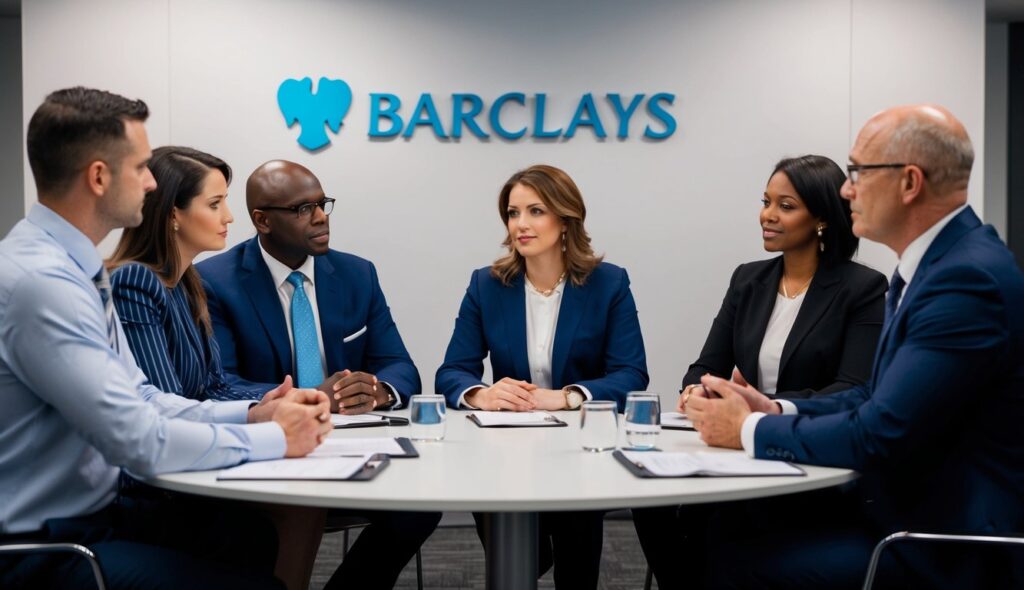
Barclays interviews vary depending on the position. You’ll find customer service, tech roles, and rounds with different focuses. Preparing for their process can improve your chances of success.
What are the common questions asked during an interview for a customer service position at Barclays?
Customer service interviews often focus on your ability to handle difficult situations and manage time effectively. You might be asked how you deal with upset customers or describe a time you solved a customer’s problem.
What can candidates expect during the various rounds of Barclays’ interview process?
Barclays commonly uses multiple rounds, including phone interviews and face-to-face meetings. Each round evaluates different skills, such as technical ability, problem-solving, and cultural fit. You should be ready to discuss your experience and answer both behavioral and technical questions.
What types of questions are typically asked in a Barclays Tech role interview?
Tech role interviews at Barclays might include questions about specific programming languages and scenarios that involve troubleshooting problems. A strong understanding of software development and analytical skills is often necessary.
Can you describe the interview experience for Barclays applicants?
Barclays uses Software for video interviews where you respond to pre-recorded questions. You may face scenario-based questions and need to review your answers before submitting. This helps assess your communication skills and response time under pressure.
What strategies can applicants use to increase their chances of success in Barclays interviews?
Researching Barclays’ values and recent developments is crucial. Practice common interview questions and refine your elevator pitch. Demonstrating confidence and understanding Barclays’ goals can set you apart from other candidates.
All the Best !



